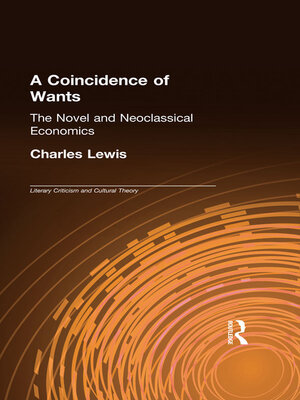A Coincidence of Wants
ebook ∣ The Novel and Neoclassical Economics · Literary Criticism and Cultural Theory
By Charles Lewis

Sign up to save your library
With an OverDrive account, you can save your favorite libraries for at-a-glance information about availability. Find out more about OverDrive accounts.
Find this title in Libby, the library reading app by OverDrive.



Search for a digital library with this title
Title found at these libraries:
| Library Name | Distance |
|---|---|
| Loading... |
This interdisciplinary study examines four major British and American novels in view of key concepts from the mainstream tradition of neoclassical economics. Studies of the novel widely address its connections to capitalism, yet literary critics and theorists rarely make reference to neoclassical perspectives, which have held a key position in the formal analysis of the marketplace for over a century.
Lewis argues that this overlooked area of economic thought, with its emphasis on subjective value, individual agency, and utility maximization, points to a previously unrecognized and important coincidence of wants between economic and novelistic discourse. In each of the four readings, Lewis uses a single economic problem from neoclassical theory as a model for interpreting novelistic form and content as economic configurations. Topics include narrative deferral, detour, and return as a performance of capital formation and economic development in Daniel Defoe's Robinson Crusoe; the emergence of the creative, risk-taking entrepreneur in Mary Shelley's Frankenstein; the representation of money in the romantic realization of trade in Herman Melville's Moby Dick; and a consumer utility theory of naturalist desire and indifference in Theodore Dreiser's Sister Carrie.
Underscoring how neoclassical theory variously elaborates on and departs from other economic approaches and periods, the author also addresses the limitations of, and the possibilities of profitable exchange with, other critical frameworks for understanding literal and symbolic economies in narrative fiction more broadly.







